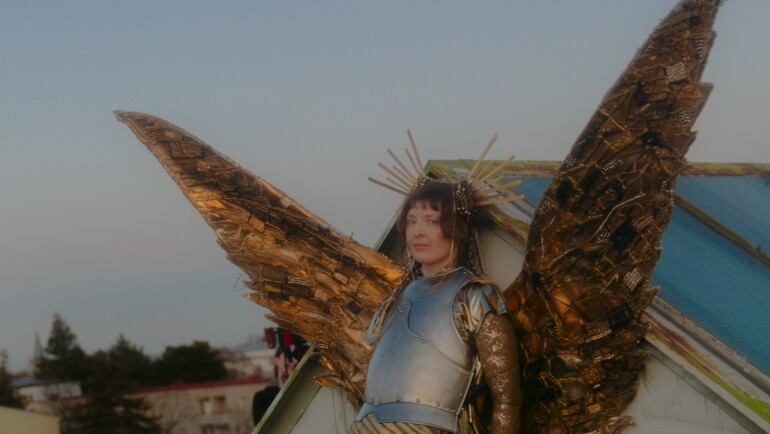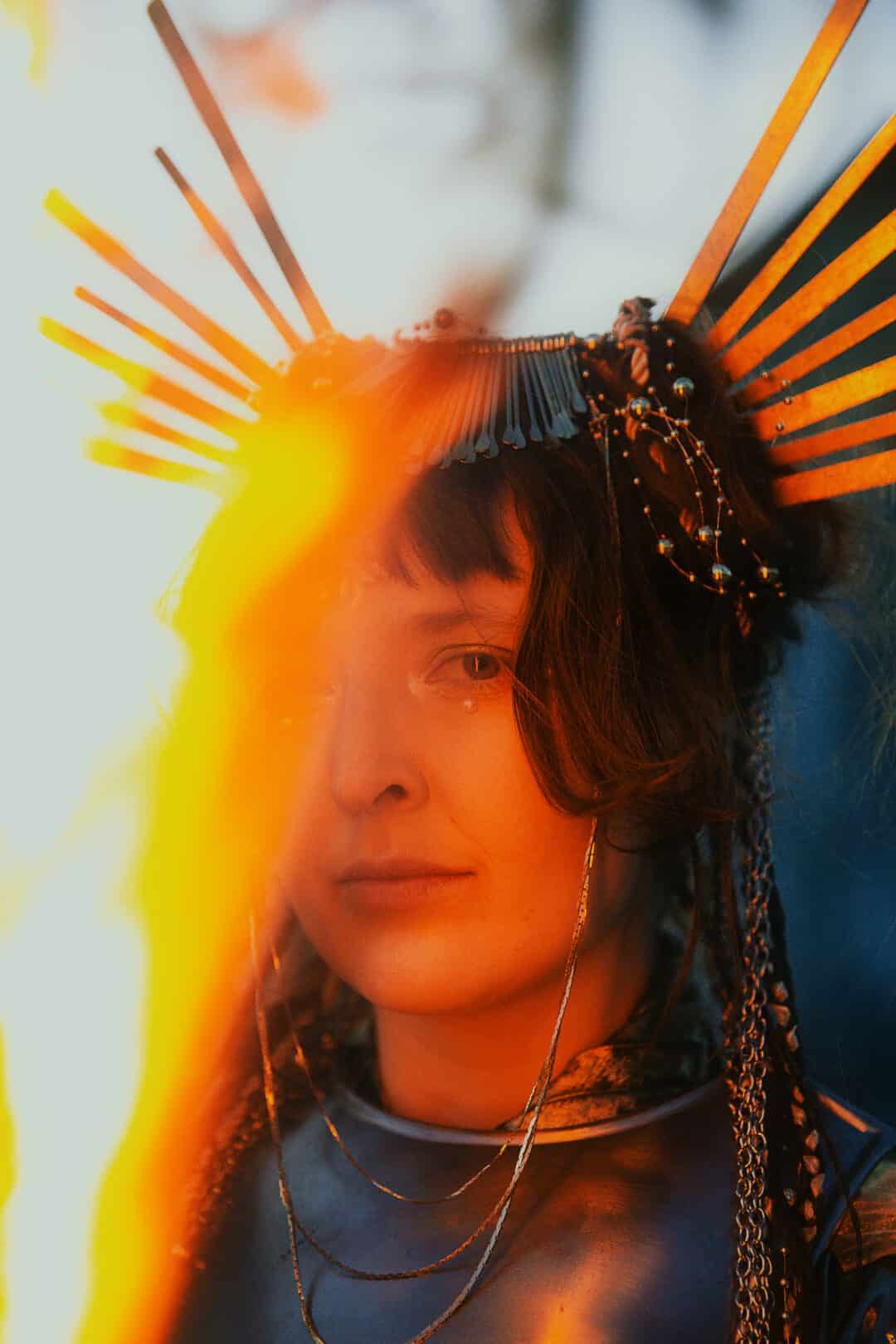
ALICIA EDELWEISS is a singer-songwriter, multi-instrumentalist, producer and performer. With “FURIE” (Glitterhouse Records), her second studio album will be released in May, on which she incorporates artistic approaches of maximalism and thus tells completely new stories. With accordion, strings, synthesizers, animal noises – and above all with a voice that is more than just singing: It’s expression, attitude, drama. ALICIA EDELWEISS spoke to Katharina Reiffenstuhl about feminism and art and told her, among other things, why she doesn’t rely on other people’s approval when playing live.
You made a conscious decision to keep your songs on the album unusually long. Why?
Alicia Edelweiss: I wrote the songs and decided not to shorten them. They are just so long. I do make radio edits, but otherwise I leave the songs as they are and try not to interfere too much with the nature of the songs.
If you do radio edits from time to time, is it important to you to have the opportunity to play the songs on mass media?
Alicia Edelweiss: Yes, yes. Although radio is no longer such a big thing, one is still a bit dependent. Unfortunately, you can’t really rely on Spotify pitching. It’s also good for the playlists if it’s shorter, I think. I used to be a bit naive and believed that it doesn’t matter what you do – good music will come out. (laughs) Now I’m a bit more sensible and understand that you have to follow certain rules for it to be heard.

“FURIE” is a strong title. What’s behind it?
Alicia Edelweiss: For me, the word is like the last line of the album, as if it closes a circle. I now see the word in a very positive light, the more I think about it, the more I see it as a compliment. I associate it with childlike and also a little animalistic energy, with not being conditioned. Behaving more like an animal: When you’re angry, you’re angry.
Fitting for the cover photo.
Alicia Edelweiss: Exactly. But I’m not trying to look scary on the cover. Otherwise I would have taken a different photo. (laughs)
Is it also an act of feminism in a way?
Alicia Edelweiss: Yes, definitely.
“AS WOMEN, WE NEED TO START BY HAVING MORE CONFIDENCE IN OURSELVES”
Music is still a male-dominated industry. Where should we start with feminism?
Alicia Edelweiss: I actually have the feeling that female musicians are really hip at the moment anyway. If you have a woman in the band, you’re already a bit upgraded, if you know what I mean. Also, if you just looked at the Grammys, CHARLI XCX, CHAPPELL ROAN and so on were right at the top. The other world though – the world of bookers, labels, producers and mixing dudes – is quite male dominated.
What are your experiences with this?
Alicia Edelweiss: I’ve actually had some bad experiences with women. (laughs) But men often underestimate you when it comes to production. Always this ‘you don’t know your stuff, I’m the specialist, trust me’. I just don’t know what the vibe would be like if I were a man, whether I would always be taken seriously. There are certainly guys who look down on everyone who is younger or has less experience. As women, I think we need to work on having more confidence in ourselves and perhaps doing more, ourselves. Personally, I realize that my biggest obstacle when making albums is that I don’t always have enough confidence in myself. I actually know that I’m really good at it and should just do it. But there’s always this voice saying ‘I need someone to help me’. There are people like SOAP&SKIN or FARCE who do everything themselves – that’s very cool. I would like to move in that direction.
If you apply that to your current album – how much did you do yourself? (It’s okay to praise yourself.)
Alicia Edelweiss: I recorded the vocals for a few songs myself. I did the production together with Wolfgang Lehmann, so I never know what percentage was done by whom, but I definitely see myself as a producer. Apart from that, I simply took over the artistic direction and bore the responsibility. Towards the end, I did more and more myself, also for financial reasons. There was hardly any budget for the album and Wolfgang didn’t have unlimited time either. Then it was almost a good thing that I was forced to do a lot myself, and I edited and produced a lot myself.
You yourself describe your album as “maximalist”. Normally everyone always praises minimalism.
Alicia Edelweiss: During corona, I totally fell for Marie Kondo, the tidiness expert. She doesn’t even call herself a minimalist, but she has this connection to it. I then decluttered a lot and said “I’m going to become a minimalist!”. At some point, I realized that I’m not a minimalist. (laughs) I just like objects, including my clothes and costumes. On the previous album, for example, I was very minimalist from my point of view, I think.
Lots of purely acoustic stuff, few overdubs. Now I wanted to do the opposite. It’s like a playground where I can do anything I want. The songs simply wouldn’t have worked minimalistically, that’s the point. I had the feeling that they didn’t work as reduced and needed more.
Does that mean you had a bit of a musical shift between the two albums?
Alicia Edelweiss: Yes, the last album was the first step, I think. It all builds on each other.
In addition to music, you now also do a lot of performance, which you’ve been studying since last year. Do you see that as a complement or a balance?
Alicia Edelweiss: As a complement. I think I try to merge everything I do. I also study performance because of the music. I find just playing music a bit boring.
You gained a lot of musical experience in southern Europe and spent some time on the road as a street musician. How did this time shape you?
Alicia Edelweiss: Very much. It was the beginning of everything. I certainly have a thicker skin when I’m on stage because I’m just used to being ignored. I’ve now played a few support shows for ENDLESS WELLNESS in Germany. The concerts were really great, but at two of them there was a bit of chatter in the background. That’s where this concept of the road comes into play a bit: you don’t have to care even if nobody is listening. I do that and play for myself, I don’t want to pay too much attention to people and their approval.
Do you have a personal favorite track on the album?
Alicia Edelweiss: I think it’s “Behind the Gates”. I’m very proud of the arrangement. It’s one of the poppier songs and just represents the album very strongly for me.
Your Instagram biography says “Don’t call me a musician it’s insulting” – why is that?
Alicia Edelweiss: Yeah, I don’t know why, I always find it a bit insulting to be called a musician. I kind of see it like this, I don’t make music, I make art. Many people can make music, you don’t have to be original to do that. I prefer to think of myself as an artist.
Thank you for the interview!
Katharina Reiffenstuhl
links
Translated from the German original by Arianna Alfreds.
